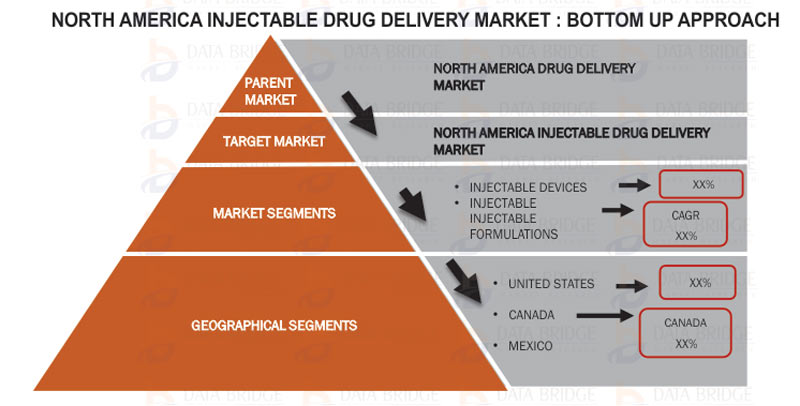North America Injectable Drug Delivery Market is expected to reach USD 354.53 billion by 2024 from USD 154.05 billion in 2016, at a CAGR of 5.4% in the forecast period 2017 to 2024. The new market report contains data for historic years 2015, the base year of calculation is 2016 and the forecast period is 2017 to 2024. Injectable drug delivery market has the largest market segment in Drug delivery market.
Access Full Report: https://www.databridgemarketresearch.com/reports/north-america-injectable-drug-delivery-market
The North America injectable drug delivery market is highly concentrated to a few big players and rest to local players who cater to domestic markets only. Becton, Dickinson and Company dominated the injectable drug delivery market accounting for a highest market share in 2016, followed by Pfizer Inc., Baxter, Gerresheimer AG. Other players in this market include Eli Lilly and Company, Terumo Corporation, Sandoz, Bespak, Teva Pharmaceutical Industries Ltd., B.Braun, Sun Pharma, SHL Group, MGlas, Owen Mumford Ltd., Alkermes, Antares Pharma, Unilife Corporation, and Terumo Corporation among others holds 23.8% of the North America injectable drug delivery market in 2016.
Becton, Dickinson and Company:
Founded in 1897 as Becton, Dickinson and Company and head quartered in New Jersey, U.S. is focused on developing, manufacturing and sales of medical supplies, devices, laboratory equipment and diagnostic products. The company operates through two business segments: BD Medical and BD Life Sciences.
Recent Developments:
- In August 2016, BD (Becton, Dickinson and Company), a leading global medical technology company, announced that it has received U.S. Food and Drug Administration (FDA) clearance for its new syringe for patients using Humulin R U-500 insulin vials.
- In Dec 2016, BD(Becton, Dickinson and Company) announced the launch of the BD Neopak 2.25 mL prefillable glass syringe, specifically designed for biopharmaceutical manufacturers that develop, manufacture and market high-value and sensitive biologic drugs that require higher quality levels and performance to treat chronic diseases such as, rheumatoid arthritis, psoriasis, lupus, and severe asthma.
Pfizer:
Incorporated in June 1942 and headquartered in New York, U.S. Pfizer Inc., is engaged in discovering, developing and, manufacturing of healthcare products. Pfizer Inc., operates through two segments: Pfizer Innovative Health (IH) and Pfizer Essential Health (EH). The Company's IH segment concentrates on creating and commercializing immunizations and prescriptions that enhance patients' lives, and in addition products for the end user health care.
Recent Developments:
- In March 2017, Pfizer Inc. and Merck announced the FDA approval of BAVENCIO (avelumab) Injection, for intravenous use which is used for the treatment of adults and pediatric patients and with metastatic Merkel cell carcinoma (mMCC).
- In February 2017, EMD Serono of Merck KGaA, Darmstadt, Germany, in the US and Canada, and Pfizer Inc. announced the US Food and Drug Administration (FDA) approval of Biologics License Application (BLA) for avelumab as a treatment for patients with locally advanced or metastatic urothelial carcinoma (mUC) with disease progression on or after platinum-based therapy.
Baxter International:
Founded in 1931 and headquartered in Illinois, U.S., Baxter International, Inc. manufactures medical devices, pharmaceuticals, and biotechnology products. The company operates through two business segments, namely, BioScience and Medical Products.
Recent Developments:
- In February 2017, Baxter International Inc. entered into a strategic partnership with ScinoPharm Taiwan, Ltd., which is one of the leading manufacturers of active pharmaceutical ingredient (API). This partnership is focused on the development, manufacturing and commercialization of five injectable drugs.
- In February 2017, Baxter International Inc., announced the expansion of its nutrition care portfolio to include the new enteral ENFit syringe and accessory line for patients requiring tube feeding.ENFit syringes are designed to improve patient safety during enteral nutrition (EN) therapy by preventing misconnections or wrong-route administration that can cause severe patient injury.











